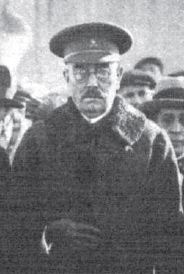Domènec Batet facts for kids
Quick facts for kids
Domènec Batet i Mestres
|
|
|---|---|

Domingo Batet photographed in 1931
|
|
| Born | August 30, 1872 Tarragona, Catalonia, Spain |
| Died | February 18, 1937 (aged 64) Burgos, Castile and León, Spain |
| Allegiance | |
| Years of service | 1887–1936 |
| Rank | General |
| Battles/wars | Cuban War of Independence Events of October the 6th Spanish Civil War |
| Awards | Laureate Cross of Saint Ferdinand |
Domènec Batet i Mestres (also known as Domingo Batet Mestres) was a brave Spanish soldier. He was born in Tarragona, Spain, on August 30, 1872. He became a very important general in the Spanish Army.
Batet started his career as a lieutenant. He quickly moved up in rank during the Cuban War of Independence. Later, as a colonel, he helped investigate a big military defeat. This investigation was called the Picasso Files. During the Second Spanish Republic, Batet was in charge of the army in Catalonia. He stopped a major uprising there in October 1934. When the Spanish Civil War began, Batet stayed loyal to the government. But his own soldiers in Burgos captured him. After some time, he was ordered to be executed.
Contents
Domènec Batet's Life Story
His Early Army Days
Domènec Batet i Mestres began his journey in the Spanish Army as a volunteer. He fought in the Cuban War of Independence. During this war, he earned many awards and was promoted several times. He also developed a strong belief in pacifism, which means he disliked war and violence.
Later, during the Rif War in North Africa, he was a colonel. He helped write a special report called the Picasso Files. This report looked into why the Spanish army faced problems there. It showed that some officers, including Francisco Franco, might have been involved in corruption.
Stopping the Catalan Uprising
After Spain became a republic, Domènec Batet was sent to Catalonia. He was the head of the Fourth Organic Division there. Batet always respected the local government, called the Generalitat of Catalonia. He treated his soldiers well and encouraged them to use the Catalan language.
In 1932, Batet handled a big workers' strike. Instead of using harsh methods, he acted quickly and carefully. This helped avoid a lot of fighting and injuries.
His most important action during these years was stopping the Events of October the 6th. This was when Catalonia tried to become a separate state. The uprising happened for several reasons. One big reason was that a right-wing political party, CEDA, joined the Spanish government. Another reason was a law about farming contracts. This law helped farmers, but the Spanish government canceled it. This made many working people in Catalonia very angry.
On October 5, 1934, a big strike started in many Spanish cities. The next day, the leader of Catalonia, Lluís Companys, declared a "Catalan Republic." Many armed groups took over streets in Barcelona and other towns. They supported Companys and captured public buildings. Companys called Batet for help, but Batet stayed loyal to the Spanish government. He cleverly bought time by asking for a written request.
While Companys was writing, Batet got his troops ready. He surrounded the main government building in Barcelona. He avoided big fights with the armed groups. Batet even fired warning shots with a howitzer (a type of cannon). After 10 hours, Companys had no choice but to surrender.
Batet handled the situation very well. He used minimal force and kept injuries low. Some people say he asked to be moved to another place to avoid fighting his own people. Others say he was moved as a punishment for being too gentle. Either way, he was transferred to Burgos.
The Spanish Civil War and His Death
In June 1936, Batet was moved to Burgos. This was where General Emilio Mola, a leader of the Nationalist side, was also stationed. When the Spanish Civil War began, Batet stayed loyal to the Republic. But his own soldiers betrayed him and put him in prison.
General Mola respected Batet, so Batet was kept in prison for a while. However, when Francisco Franco became the main leader of the Nationalists, he ordered Batet's execution. Some sources say this was because of the Picasso Files. In that report, Batet had pointed out Franco's actions during the Rif War. Batet was executed on February 18, 1937.
See also
 In Spanish: Domingo Batet para niños
In Spanish: Domingo Batet para niños
- Francesc Macià
- Mossos d'Esquadra
- Juan Prim y Prats
 | Mary Eliza Mahoney |
 | Susie King Taylor |
 | Ida Gray |
 | Eliza Ann Grier |

